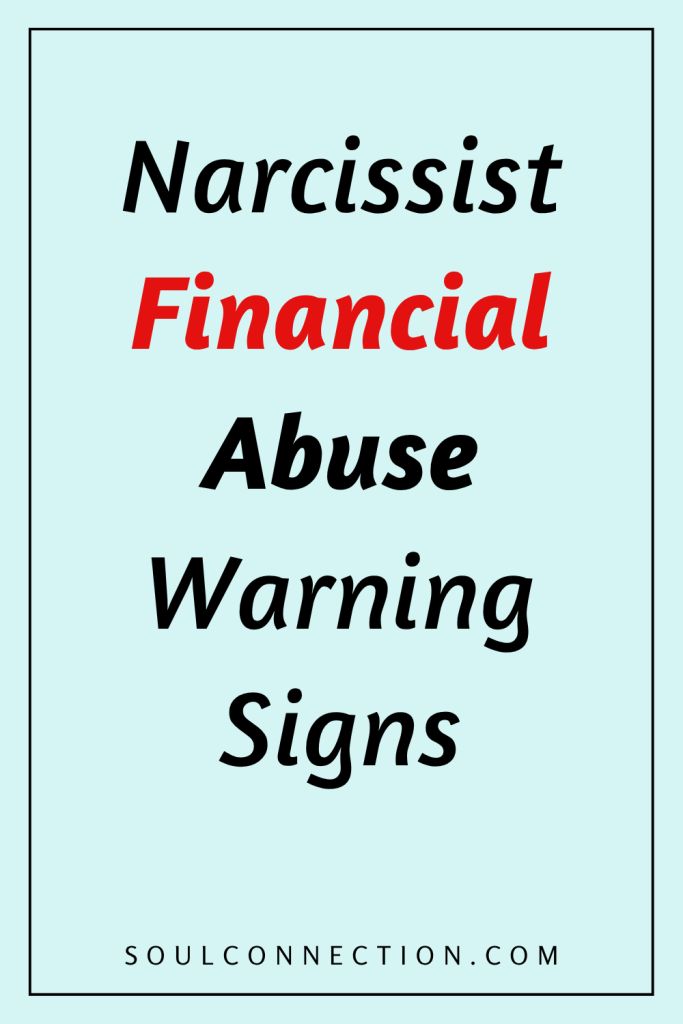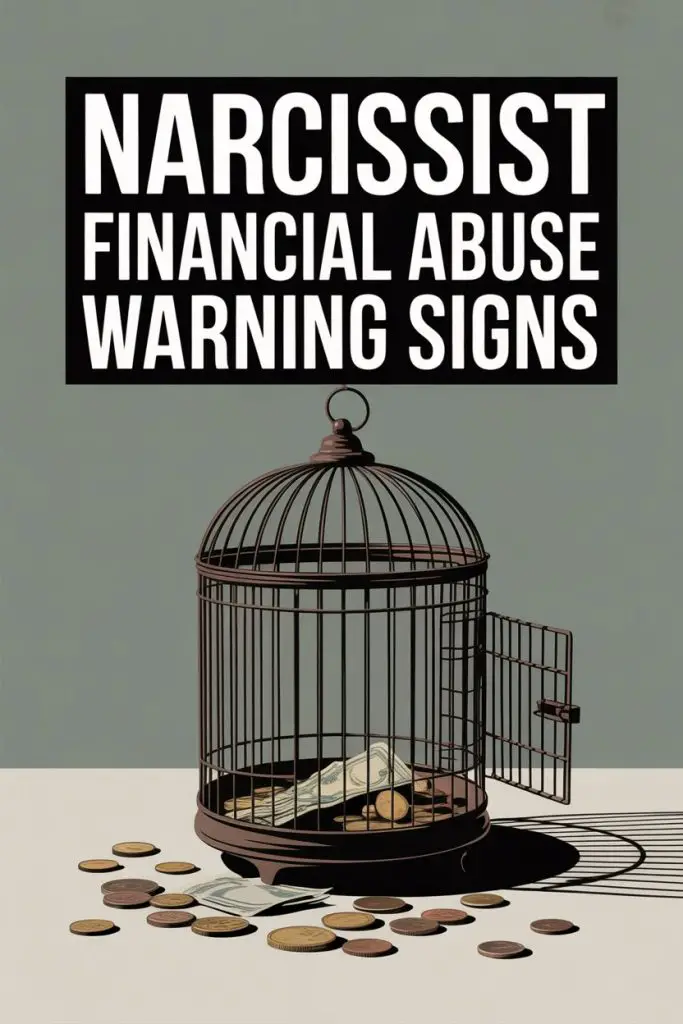Ever had someone make you feel small, confused, and broke—all at the same time? That’s not the universe testing your patience. That might be a narcissist messing with your finances.
Most folks know narcissists love all eyes on them, but fewer people realize how often they weaponize money. It’s time to spot those red flags before your wallet waves a white one.
What Is Narcissistic Financial Abuse Anyway
Not everyone who’s tight with money is a narcissist. Some people are just allergic to spending.
Narcissistic financial abuse, though, comes with a side of control, manipulation, and often a pinch of emotional blackmail.
The narcissist isn’t stingy because they value thrift. They use money like a leash: to control, punish, or keep you anxious. And, of course, to make sure you never have the resources—or confidence—to walk away.
The Subtle Start: Love-Bombing With Your Wallet
At first, a narcissist might seem like the best thing that’s ever happened to your bank account. Big gestures, lavish gifts, surprise holidays—look, it’s raining roses (and receipts).
But watch out. This generosity comes with strings thicker than your grandma’s knitting wool. Down the track, that “generosity” gets flipped as leverage. “After all I’ve spent on you, you owe me.”
Spending is used as a tool to bond you, then bind you.
Keeping Tabs Like It’s Their Day Job
Ever had every penny you spend questioned? Narcissists are Olympic-level accountants, with only one client: you.
Maybe you’re asked to account for your purchases, or quizzed about why you needed a new pair of socks. Sometimes it’s more subtle—disappointment, sulking, or “jokes” about your spending habits.
None of this is rooted in concern for your shared finances. It’s about control. Your independence is a threat.
The Vanishing Money Trick
Suddenly, joint accounts are a one-way street. Money disappears, explanations go missing, and your partner always seems to have a new toy or a story to justify their spending.
Receipts evaporate. Shared funds shrink mysteriously. Maybe you’re told, “I’ll handle the bills,” and you just never see the statements again.
Magic! Except you’re the only one left wondering where your cash went.
Weaponizing Allowances and Budgets
A narcissist loves doling out “allowances” more than a retired school principal. You might get a strict weekly amount—barely enough for groceries—while they splash out guilt-free.
Budgets can be a clever disguise. “We need to be careful,” they say, as you count coins for lunch and they come home with the latest gadget.
Control gets dressed up as financial prudence.
Forbidding You From Earning
Some narcissists ban you from working outright. “I just want to look after you.” “Who will take care of the kids?” “Your job is so stressful—I hate to see you like that.”
All deliciously wrapped in concern. But the real motive? Isolation.
When you don’t have your own income, you can’t leave. That’s not love—it’s house arrest.
Sabotaging Your Work
If outright banning you seems obvious, many narcissists opt for sabotage, which comes in all shapes and sizes.
They might “forget” to pick up the kids, making you late for work. Maybe they start drama before your big meeting.
Or they criticize and undermine you so much that quitting starts to look like a mercy.
It’s all about cutting off your financial options.
Racking Up Debt in Your Name
Some narcissists don’t just control existing money—they create financial chaos. Maybe they open credit cards in your name, or “borrow” your details (without asking, naturally).
Before you know it, you’re getting calls from debt collectors about money you never spent. Your credit is trashed. Good luck getting a car loan after this circus leaves town.
Guilt Trips and Gaslighting Galore
Ever heard, “Why do you need your own account? Don’t you trust me?” “You’re so materialistic.” “We’re a team, why are you hiding money?”
Suddenly, you’re the villain for wanting a bit of financial breathing room. Any attempt to talk about money turns into a melodrama starring you as the selfish one.
Hello, emotional manipulation.
Hiding Assets and Lying About Money
Narcissists love secrets—especially when it comes to assets. Maybe you find out about a secret account, investments you never knew existed, or “forgotten” debts.
And if you ask questions? It’s all smoke and mirrors: “I told you about that!” “It’s not a big deal.” “You must be imagining things.”
If you feel like you’re losing your grip on reality, you probably are—because you’re not getting the full story.
Sudden Changes in Generosity
Yesterday, you’re treated to dinner. Today, you’re shamed for buying toothpaste.
The switch flips fast. Gifts become rare. Suddenly, you’re accused of bleeding them dry. This isn’t just moodiness: it’s a way to keep you off balance, never sure what’s coming next.
Predictability is the enemy of control.
Making You Beg for Basics
Nothing says “I love you” like having to justify why you need money for tampons.
Narcissists put you in positions where you must ask, explain, and justify every basic expense. The humiliation is the point. It reinforces their power, and—bonus!—keeps you dependent.
Threatening or Withholding Money as Punishment
Pick a fight, want to visit friends, or (heaven forbid) talk about leaving? Suddenly, your “allowance” is late, the card is declined, or the rent doesn’t get paid.
Withholding money is their version of a time-out. Classic power play.
Overspending to Tank Both Your Futures
Some narcissists love to spend—especially if they can take you down with them. Maybe they empty your joint account on a whim, buy themselves expensive toys, or rack up loans you’re both liable for.
“Live for today!” they say, while mortgaging your tomorrow.
Minimizing Your Concerns
If you voice worries, you’re told, “You’re overreacting.” “All couples fight about money.” “Why do you have to be so controlling?”
Your valid concerns get minimized until you don’t bother raising them. Silence, after all, is golden—to them.
Making Escape Seem Impossible
The net result of all these tactics? You don’t just feel broke—you feel trapped.
Maybe you believe you’re too financially ruined to leave. Maybe you’re scared no one would believe you. Maybe you’re convinced you’re simply bad with money and deserve this.
That’s exactly where a narcissist wants you. Stuck, isolated, and doubting yourself.
What To Do If You Spot the Signs
Spotting financial abuse is like seeing the leak in the boat. It’s not your fault—but you do need to grab a bucket.
Start with small steps:
- Find someone safe to talk to, whether it’s a trusted friend, a helpline, or a counselor. You’re not alone, and you’re not imagining this.
- If possible, start stashing a little cash somewhere safe. Even a tenner in an old coffee tin can be the difference between stuck and free.
- Open an account in your own name, if you can do so safely. Some banks even have discreet ways to help survivors.
Document everything: bank statements, texts, emails. Screenshots are your best friend. If you ever decide to leave or seek legal help, that evidence can make a world of difference.
It’s Not Just About the Money
Financial abuse is about power, not pounds or dollars.
Yes, you deserve a partner who respects your independence—and your right to buy a sandwich without a full-blown inquisition.
Yes, these signs are sneaky and can catch even the sharpest among us off guard.
But armed with a little knowledge, and a lot of self-kindness, you can spot the signs and start reclaiming your power.
And if someone tells you you’re “bad with money” while keeping you broke? Maybe the real problem is they’re bad for you.
No one deserves a relationship that comes with a receipt for your soul.


